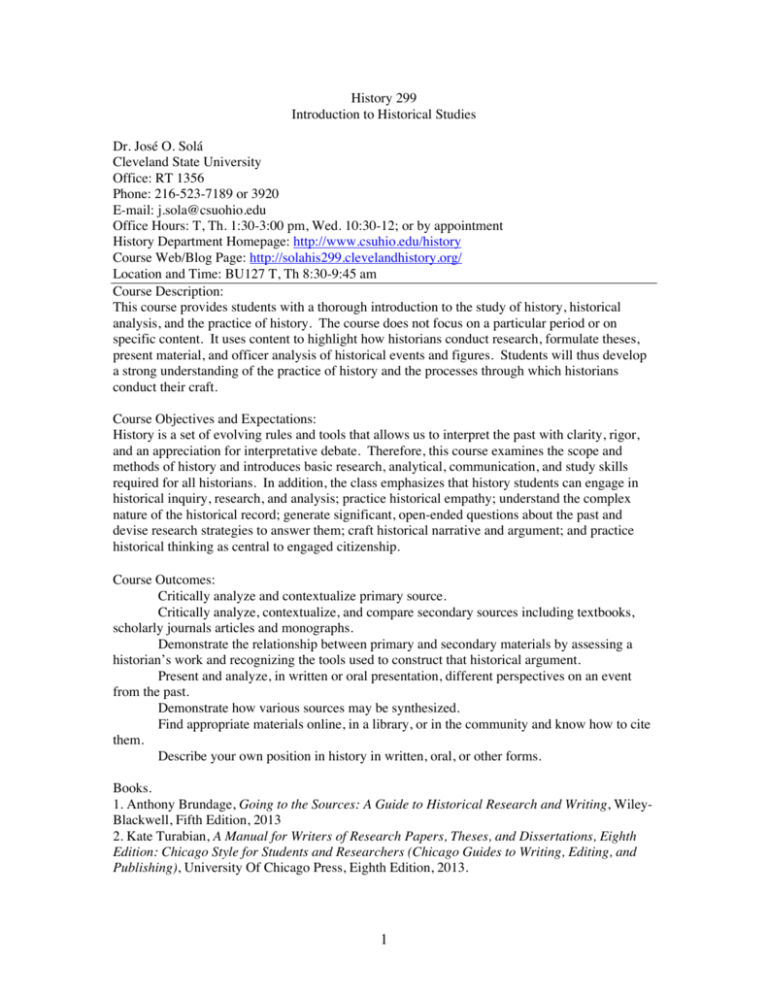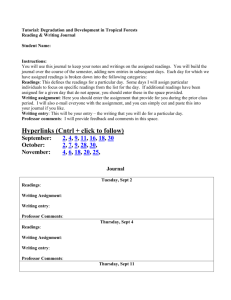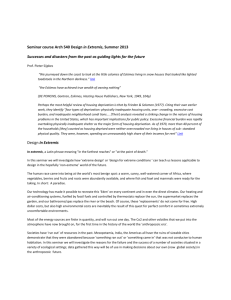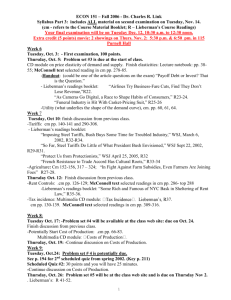His299syllabusfall15 - Introduction to Historical Studies
advertisement

History 299 Introduction to Historical Studies Dr. José O. Solá Cleveland State University Office: RT 1356 Phone: 216-523-7189 or 3920 E-mail: j.sola@csuohio.edu Office Hours: T, Th. 1:30-3:00 pm, Wed. 10:30-12; or by appointment History Department Homepage: http://www.csuhio.edu/history Course Web/Blog Page: http://solahis299.clevelandhistory.org/ Location and Time: BU127 T, Th 8:30-9:45 am Course Description: This course provides students with a thorough introduction to the study of history, historical analysis, and the practice of history. The course does not focus on a particular period or on specific content. It uses content to highlight how historians conduct research, formulate theses, present material, and officer analysis of historical events and figures. Students will thus develop a strong understanding of the practice of history and the processes through which historians conduct their craft. Course Objectives and Expectations: History is a set of evolving rules and tools that allows us to interpret the past with clarity, rigor, and an appreciation for interpretative debate. Therefore, this course examines the scope and methods of history and introduces basic research, analytical, communication, and study skills required for all historians. In addition, the class emphasizes that history students can engage in historical inquiry, research, and analysis; practice historical empathy; understand the complex nature of the historical record; generate significant, open-ended questions about the past and devise research strategies to answer them; craft historical narrative and argument; and practice historical thinking as central to engaged citizenship. Course Outcomes: Critically analyze and contextualize primary source. Critically analyze, contextualize, and compare secondary sources including textbooks, scholarly journals articles and monographs. Demonstrate the relationship between primary and secondary materials by assessing a historian’s work and recognizing the tools used to construct that historical argument. Present and analyze, in written or oral presentation, different perspectives on an event from the past. Demonstrate how various sources may be synthesized. Find appropriate materials online, in a library, or in the community and know how to cite them. Describe your own position in history in written, oral, or other forms. Books. 1. Anthony Brundage, Going to the Sources: A Guide to Historical Research and Writing, WileyBlackwell, Fifth Edition, 2013 2. Kate Turabian, A Manual for Writers of Research Papers, Theses, and Dissertations, Eighth Edition: Chicago Style for Students and Researchers (Chicago Guides to Writing, Editing, and Publishing), University Of Chicago Press, Eighth Edition, 2013. 1 3. Randy J. Sparks, The Two Princes of Calabar: An Eighteenth-Century Atlantic Odyssey, Harvard University Press, 2009. And a series of articles and chapters located on the course blog. Course Expectations: 1. Attendance and Participation: Attendance is a critical part of your learning experience. This portion of your overall grade is evaluated by your presence in class, your preparation for the class your attentiveness, and your contribution to classroom discussion and the classroom environment. Tardiness, absences and excessive interruptions (web surfing, cell phone usage, chatting) and lack of participation will all result in a poor attendance and participation grade. Beware: Students who miss more than 4 classes (two weeks of class) will have their final grade lowered one full letter grade. 50 points 2. Reading Summaries and Analyses: Over the course of the semester, students will be expected to submit 5 summaries or analyses (TBD by the type of assignment). In the assignment, students will write a one-page response to a particular question for the materials assigned for the week. The piece will focus on the subject and on the argument. These are due at the beginning of the class and will not be accepted late. Each assignment will be 10 points each for a total of 50 points. 3. There will be ONE PRIMARY DOCUMENT EXERCISE. In this exercise you, the student, should demonstrate the ability to locate and use a range of secondary materials to contextualize and analyze primary sources, address major problems, and make evidence-based arguments. 50 points. 4. Final Paper: Students will write a final paper in which they outline and explain at two of the various schools of history studied over the course of the semester. The paper will be 6 to 8 pages in length, and will include footnotes formatted in Turabian or “Chicago” style of citation. The paper will be base on the book: The Two Princes of Calabar: An Eighteenth-Century Atlantic Odyssey, Randy J. Sparks. This paper will be 100 points. The maximum number of points you can earn: 250 points. Class Format: In general (although not always: check your syllabus!), most class days will be devoted to discussion and lectures. In fact, I should note that I do not recognize clear boundaries between my lectures and discussions and we will move continuously between them. To a large extent this is due to the objectives, which I have established for myself. We will be relying to a very large extent on secondary publications and primary sources, the very heart of history, so it is very important for you to stay current with your reading assignments. Class discussion will explore, in greater depth, specific themes or issues. Students are expected to attend all classes, having read carefully the reading assignments for that session. Philosophy and Warning I like take-home assignments because they permit you to decide how much time, energy and creativity you wish to commit to each activity. I find the responses better and more completely thought out. I encourage you to work with fellow students to develop a better understanding of the material. However, you need to be very careful that the written work you submit is your own work. It is acceptable in this class to cooperate even to the point of developing a common outline 2 but at that point you need to work alone. I take cheating very seriously and reserve the right to fail you in the course for submitting work which is not yours or which you have permitted others to submit as if it were their own. Study groups are very important ways of peer learning. It also reflects the reality of our lives - we generally work with others and not in isolation. Just be sure that the work you submit is your own. PLEASE NOTE: If you are having problems with the readings, the lectures, blog/web page or just want to discuss further any aspect of the course (from content to class dynamics), I strongly encourage you to see me during office hours or to make an appointment. Please don’t wait until late in the semester to express these concerns. Policy on Incomplete: A grade of “I” for the course will be given to students who have performed satisfactory in class but because of some emergency have been unable to complete one of the class requirements. Late assignments: I will subtract one later grade for each day (not class meeting) a take home essay or paper is late. After an assignment is three days late, I will not accept it. Academic Integrity Statement of Academic Integrity: Plagiarism is a violation of the CSU Code of Conduct and is a very serious matter. It will be treated appropriately. Using someone else’s ideas or phrasing and representing those ideas or phrasing as our own, either on purpose or through carelessness, is a serious offense known as plagiarism. “Ideas or phrasing” includes written or spoken material ranging from whole papers and paragraphs to sentences and phrases. “Someone else” can mean a professional source, such as a published writer or critic in a book, magazine, encyclopedia, or journal; an electronic resource such as material we discover on the World Wide Web; another student at our school or anywhere else; and a paper-writing “service” (online or otherwise) which offers to sell written papers for a fee. Thematic Outline and Reading Assignments Week 1 INTRODUCTION Tuesday, Aug 25 Introduction Thursday, Aug 27 The Historical profession Readings: Anthony Brundage, Going to the Sources, ch. 1; John H. Arnold, History. A Very Short Introduction, ch. 1 Week 2 Primary and Secondary Sources Tuesday, Sept 1 Identifying and Using Primary Sources Readings: Brundage, Going to the Sources, ch. 2 (pages 19-24), 3, 6 Thursday, Sept 3 Readings: Brundage, Going to the Sources, ch. 2 (pages 24-32), 5; Video: What is Historiography? Week 3 Schools of History Tuesday, Sept 8 Research and Writing 3 Readings: Kate Turabian, A Manual for Writers, ch. 1-4 Thursday, Sept 10 Varieties of History Readings: Norman J. Wilson, History in Crisis?, ch. 4. Week 4 Politics and History Tuesday, Sept 15 Readings: Nash, History on Trial, ch. 2-3 Thursday, Sept 17: Power and Histtory Readings: Michel-Rolph Trouillot, Silencing the Past, ch. 1 Week 5 Transnational or Global History, Digital Humanities Tuesday, Sept 22 On Transnational History Readings: C. A. Bayly, Sven Beckert, Matthew Connelly, Isabel Hofmeyr, Wendy Kozol and Patricia Seed, “Conversation: On Transnational History,” The American Historical Review, Vol. 111, No. 5 (December 2006), pp. 1441-1464 Thursday, Sept 24 Visit by Erin Bell, CSU Digital Humanities Week 6 The Long Duration Tuesday, Sept 29 Annals Readings: Michael Harsgor, “Total History: The Annales School,” Journal of Contemporary History, Vol. 13, No. 1 (Jan., 1978), pp. 1-13 Thursday, Oct 1 Beyond the French School Readings: John L. Harvey, “An American Annales? The AHA and the Revue internationale d’histoire économique of LucienFebvre and Marc Bloch,” The Journal of Modern History, Vol. 76, No. 3 (September 2004), pp. 578-621 Week 7 Micro History, Public History Tuesday, Oct 6 What is Micro History Readings: Steven Bednarski, A Poisoned Past, ch. 1 Thursday, Oct 8 Public History: Guest Speaking Dr. Mark Souther Readings: TBA Week 8 Social History Tuesday, Oct 13 (NO Classes) Thursday, Oct 15 All History is Social History? Readings: Peter N. Stearns, “ Social History and World History: Prospects for Collaboration,” Journal of World History, Vol. 18, No. 1 (Mar., 2007), pp. 43-52 Week 9 Gender Tuesday, Oct 20 Women’s or Gender History Readings: Joan W. Scott, “Gender: A Useful Category of Historical Analysis,” The American Historical Review, Vol. 91, No. 5 (Dec., 1986), pp. 1053-1075. Thursday, Oct 22 World History and Gender 4 Readings: Merry Wiesner-Hanks, “World History and the History of Women, Gender, and Sexuality,” Journal of World History, Vol. 18, No. 1 (Mar., 2007), pp. 53-67. Week 10 Special Topics Tuesday, Oct 27 Visit by Brian Carroll, Medical Humanities Guest Speaker Readings: TBA Thursday, Oct 29 Slave Data Overview Week 11 Post-modernism Tuesday, Nov 3 What Text? Readings: Wilson, History in Crisis?, ch. 6. Thursday, Nov 5 Reading Day Week 12 Slave Data Exercise, in class activity Tuesday, Nov 10 Thursday, Nov 12 Readings: Turabian, A Manual for Writers, ch. 5-10 Week 13 Cross Pollination and Future History Tuesday, Nov 17 History and its Friends Readings: Wilson, History in Crisis?, ch. 3 Thursday, Nov 19 Future History? Readings: Wilson, History in Crisis?, ch. 7 Week 14 Whose History Tuesday, Nov 24 The meanings of history Reading: Nash, History on Trial, ch. 7-8 Thursday, Nov 26 (Thanksgiving) Week 15 Micro History Tuesday, Dec 1 Thursday, Dec 3 Reading: Randy J. Sparks, The Two Princes of Calabar: An Eighteenth-Century Atlantic Odyssey, Harvard University Press, 2009. Week 16 Finals Week, Exam Thursday Dec 10 (8-10 am) 5





